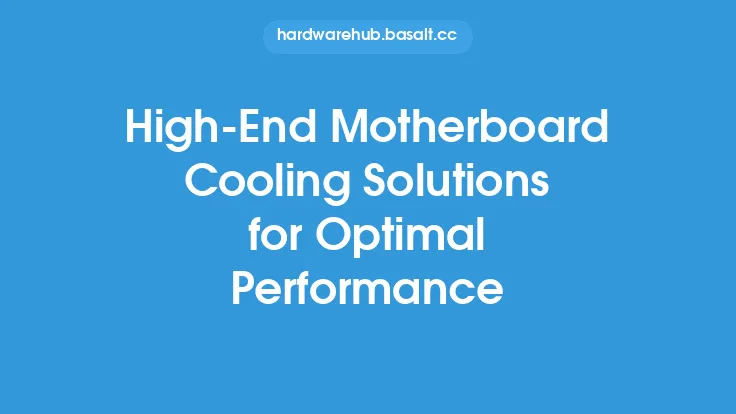High-performance computing (HPC) has become a crucial aspect of various industries, including scientific research, engineering, finance, and entertainment. The increasing demand for faster and more efficient computing systems has led to the development of powerful hardware components, such as central processing units (CPUs), graphics processing units (GPUs), and high-speed memory modules. However, these components generate significant amounts of heat, which can lead to reduced performance, increased power consumption, and even system failures. To mitigate these issues, custom cooling solutions have become essential in HPC applications.
Introduction to Custom Cooling Solutions
Custom cooling solutions are designed to meet the specific thermal management needs of HPC systems. These solutions can be tailored to address the unique cooling requirements of various hardware components, such as CPUs, GPUs, and memory modules. Custom cooling solutions can be categorized into several types, including air-based, liquid-based, and hybrid cooling systems. Air-based cooling systems use fans and heat sinks to dissipate heat, while liquid-based cooling systems utilize liquids, such as water or refrigerants, to absorb and transfer heat. Hybrid cooling systems combine air-based and liquid-based cooling methods to achieve optimal thermal management.
Thermal Management Challenges in HPC
HPC systems pose significant thermal management challenges due to the high heat flux generated by powerful hardware components. The heat flux can exceed 100 W/cm², which is significantly higher than the heat flux generated by standard computer systems. Moreover, HPC systems often operate in dense configurations, which can lead to increased temperatures and reduced airflow. To address these challenges, custom cooling solutions must be designed to provide efficient heat transfer, high airflow rates, and precise temperature control.
Custom Cooling Solution Design Considerations
The design of custom cooling solutions for HPC applications requires careful consideration of several factors, including heat load, airflow, and pressure drop. Heat load refers to the amount of heat generated by the hardware components, while airflow and pressure drop determine the cooling system's ability to dissipate heat. Other design considerations include the type of cooling fluid, pump power, and heat exchanger design. Additionally, custom cooling solutions must be designed to minimize noise, vibration, and corrosion, while ensuring reliability, maintainability, and scalability.
Liquid Cooling Systems for HPC
Liquid cooling systems have become increasingly popular in HPC applications due to their high cooling efficiency and low noise levels. These systems use a liquid coolant to absorb heat from the hardware components and transfer it to a heat exchanger, where it is dissipated to the ambient air or water. Liquid cooling systems can be further categorized into several types, including direct liquid cooling, indirect liquid cooling, and immersion cooling. Direct liquid cooling involves circulating the liquid coolant directly over the hardware components, while indirect liquid cooling uses a heat exchanger to transfer heat from the hardware components to the liquid coolant. Immersion cooling involves submerging the hardware components in a liquid coolant, which provides excellent heat transfer and reduced noise levels.
Air Cooling Systems for HPC
Air cooling systems are still widely used in HPC applications due to their simplicity, low cost, and ease of maintenance. These systems use fans and heat sinks to dissipate heat from the hardware components. Air cooling systems can be designed to provide high airflow rates and precise temperature control, making them suitable for HPC applications with moderate heat loads. However, air cooling systems can be limited by their low cooling efficiency and high noise levels, especially in dense configurations.
Hybrid Cooling Systems for HPC
Hybrid cooling systems combine air-based and liquid-based cooling methods to achieve optimal thermal management in HPC applications. These systems use a liquid coolant to absorb heat from the hardware components and transfer it to a heat exchanger, where it is dissipated to the ambient air using fans. Hybrid cooling systems offer several advantages, including high cooling efficiency, low noise levels, and improved reliability. However, they can be more complex and expensive than air-based or liquid-based cooling systems.
Conclusion
Custom cooling solutions play a critical role in high-performance computing applications, where thermal management is essential for ensuring reliable and efficient operation. By understanding the thermal management challenges and design considerations, custom cooling solutions can be designed to provide optimal heat transfer, high airflow rates, and precise temperature control. Whether using air-based, liquid-based, or hybrid cooling systems, custom cooling solutions can help mitigate the thermal challenges associated with HPC applications, enabling faster, more efficient, and more reliable computing systems. As the demand for HPC continues to grow, the importance of custom cooling solutions will only continue to increase, driving innovation and advancements in thermal management technologies.





